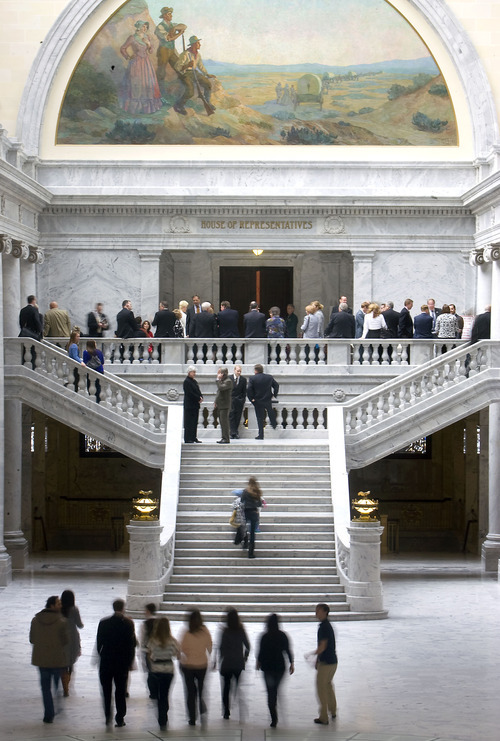This is an archived article that was published on sltrib.com in 2011, and information in the article may be outdated. It is provided only for personal research purposes and may not be reprinted.
One of every eight Utah legislators technically violated an ethics rule last year that required them to take online ethics training by Dec. 31.
But after staffers called to advise the procrastinating lawmakers that they had missed the deadline, they all scurried and completed the training a few hours later, according to data obtained by The Salt Lake Tribune through an open-records request.
Lobbyists did much worse than lawmakers, however.
Online records show that the state has 468 registered lobbyists, but only 300 had completed the required online training as of March 4. Three others had partially completed it. So roughly two of every five did not do the training.
Also, of the 300 who did finish, 45 did so after the Dec. 31 deadline — meaning one of every seven of them was late.
The 168 lobbyists who did not finish the training likely won't face penalties this year, but may in the future because of new legislation.
John L. Fellows, general counsel for the Legislature, said the only sanction now allowed by law is that lobbyists not doing the training could be "subject to an ethics complaint."
That might sully their reputation a bit with the lawmakers they are trying to persuade, but not have much other effect, said Mark Thomas, elections director for the Lieutenant Governor's Office.
—
New law • However, lawmakers this year passed SB251, sponsored by Senate President Michael Waddoups, R-Taylorsville. If signed by Gov. Gary Herbert, it would allow the Lieutenant Governor's Office to fine such lobbyists up to $1,000 for each offense. If they fail to take the training two years in a row, their lobbying license could be revoked.
Thomas said the bill also would transfer responsibility for training lobbyists from the Office of Legislative Research and General Counsel to the Lieutenant Governor's Office. "So we likely won't issue any lobbying licenses to people who haven't finished the training, so that will do away with the situation of having lobbyists who have not taken it," he said.
In 2009, the Legislature passed a law requiring its members and lobbyists to complete online ethics training every year, and leaders later adopted a rule setting a Dec. 31 deadline for it. The public may also take the same training, available at the Legislature's website, le.utah.gov.
Senate Majority Whip Wayne Niederhauser, R-Sandy, was among the 12 of 83 returning legislators who missed that 2010 deadline.
"I had been reminded by staff maybe a couple of weeks before [the deadline] and maybe two months before," he said. "So it's not like I wasn't warned. But I was working on bills and was busy with other things, and I put it on the back burner."
He said staff called him again after he finally missed the deadline. "I got on it quickly and did it," he said.
In fact, state records show that Niederhauser did the required three units of training all on New Year's Day, finishing the first at 5:19 p.m., the second at 5:27 p.m. and the third at 5:42 p.m.
Likewise, 10 of the other 11 lawmakers who missed the deadline also finished their training a bit belatedly on Jan. 1. The other one, Rep. Mike Noel, R-Kanab, finished it on Jan. 4.
Niederhauser says he found the online ethics training valuable.
"When I started, I was thinking that I just did this last year and I know all of this. But I found there were some good reminders. I think it was modified and updated, and it had more information," he said.
"There are plenty of rules for us to follow, and it can be overwhelming," he said. "We ought to do it [the training] just to be reminded of them."
—
Ethics exercises • Some of the training can seem pretty obvious — but it takes away any excuses that lawmakers or lobbyists did not realize something violated the rules.
An example of one such fairly obvious question says an old friend of a lawmaker calls and "suggests that your families get together for another trip to Disneyland. She says her business will pay the expenses if 'we can get this bill through,' " and asks for help to pass it. It asks if the lawmaker can accept the trip. Ethics rules prohibit accepting anything in exchange for a vote or help.
Clark Aposhian, a lobbyist for groups including the Utah Shooting Sports Council, was among the many lobbyists who had not done the training. He said he did it in 2009, "but I didn't realize that you had to do it every year."
He added, "Now that I've been advised, I'll do it immediately." After he asked what the penalty for doing it late may be, he said, "I certainly don't want an ethics complaint against me, so I will go and take care of it." He called later to report that he had completed it.
Besides Noel, all lawmakers who missed the deadline were senators — showing, perhaps, that the House had a better system of reminding its members to do it.
Besides Niederhauser, the other senators who missed the training deadline were Sens. Chris Buttars, R-West Jordan (who resigned at the end of the session); Allen Christensen, R-North Ogden; Gene Davis, D-Salt Lake City; Peter Knudson, R-Brigham City; Dan Liljenquist, R-Bountiful; Mark Madsen, R-Eagle Mountain; Luz Robles, D-Salt Lake City; Howard Stephenson, R-Draper; Jerry Stevenson, R-Layton; and Stephen Urquhart, R-St. George.



